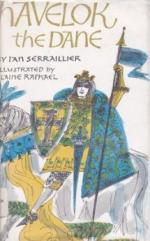I have said that this clearness came with the turn of the tide, and now that began to flow strongly, setting in with the wind with more than its wonted force, for the northwest shift of the gale had kept it from falling, as it always will on this coast. That, of course, I learned later, but it makes plain what happened next. Our anchor began to drag with the weight of both tide and wind, and that was the uttermost of our dread.
Slowly it tore through its holding, and as it were step by step at first, and once we thought it stopped when we had paid out all the cable. But wind and sea were too strong, and presently again we saw the shore marks shifting, and we knew that there was no hope. The ship must touch the ground sooner or later, and then the end would come with one last struggle in the surf, and on shore was no man whose hand might be stretched to drag a spent man to the land, if he won through. It would have seemed less lonely had one watched us, but I did not know then that no pity for the wrecked need be looked for from the marshmen of the Lindsey shore. There was not so much as a fisher’s boat of wicker and skins in sight on the sandhills, where one might have looked to see some drawn up.
Now my father went to the cabin and told my mother that things were at their worst, and she was very brave.
“If you are to die at this time, husband,” she said, “it is good that I shall die with you. Better it is, as I think, than a sickness that comes to one and leaves the other. But after that you will go to the place of Odin, to Valhalla; but I whither?”
Then spoke little Withelm, ever thoughtful, and now not at all afraid.
“If Freya wants not a sailor’s wife who is willing to fight the waves with Grim, my father, it will be strange.”
My mother was wont to say that this saying of the child’s did much to cheer her at that time, but there is little place for a woman in the old faiths. So she smiled at him, and that made him bold to speak of what he had surely been thinking since the storm began.
“I suppose that Aegir is wroth because we made no sacrifice to him before we set sail. I think that I would cast the altar stones to him, that he may know that we meant to do so.”
This sounds a child’s thought only, and so it was; but it set my father thinking, and in the end helped us out of trouble.
“I have heard,” my father said, “that men in our case have thrown overboard the high-seat pillars, and have followed them to shore safely. We have none, but the stones are more sacred yet. Overboard they shall go, and as the boat with them goes through the surf we may learn somewhat.”




